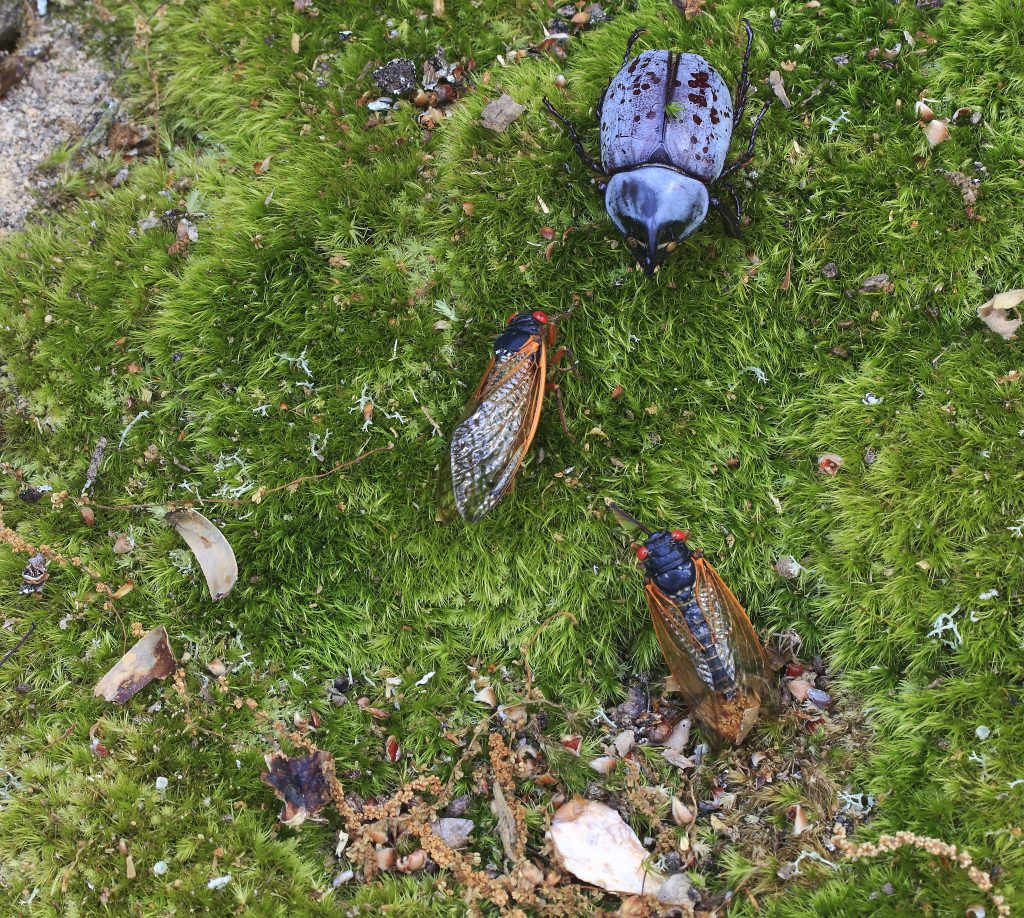Cicadas’ Rise & Fall
May 14, 2024By Tom Poland
A spring or summer day isn’t quite Southern without singing cicadas and it seems our annual cicadas love the heat of day come summer, singing best during sultry hours. To me, the singsong rise and fall of cicadas, a storm’s earthy rain fragrance, and the happy singing of rain frogs trademark warm seasons in the South. Sure cicadas and frogs exist throughout the world but our cicadas and frogs give the South dimension, a sort of grandeur. There’s something especially Southern about cicadas, the annual variety and the spectacular periodical ones.

Cicadas and a scarab beetle, all dead.
James Dickey alluded to them in Deliverance. The men drive into the fictional town of Oree, seeking drivers to take their cars to where they plan to end their canoe trip down the Cahulawassie. “We went to a Texaco station and asked if there was anybody there who’d like to make some money. When Lewis killed the engine, the air came alive and shook with insects, even in the center of town, an in-and-out responding silence of noise.” That’s a good description.
And now the air shakes with a noise like no other thanks to our 17-year periodical cicadas, those alien bugs with red bulbous eyes. These industrial-strength cicadas are pretty much harmless, neither biting nor stinging. They don’t even harm plants that much. And yet so many folks tell me they can’t tolerate them. “I’ll be glad when they’re gone,” some say. “They scare me flying all over like they are out of control,” say others. “They make a mess of my driveway. I have to hose it down.” “They’re ugly. They look like weird roaches.” Those things clinging to trees look like pork rinds.” And so it goes …
Well, I like them. They remind me yet again of the remarkable life strategies nature gives her creatures. And something else. I suspect cicadas would have a say about our cars and trucks zooming down the road crushing all insects in their path.
One thing’s for sure. No other insect creates as much excitement as periodical cicadas. You get up one morning, hear a sound that reverberates through the woods, walk outside, and see the critters darting about, and you know you’re in for several weeks of clamoring, flying bugs. From dawn to night, the males shatter the quiet with their ear-splitting song. It’s like some mega machinery howling at thousands of revolutions per minute. It’s said the male cicada makes the loudest sound in the insect world. Its trilling can carry up to a mile. The trilling is all about attracting a female.
They’re fading now. This stage of life is soon to end. Once the little critters consummate their relationship, the female will lay eggs within the branch tips. The young will emerge six to 10 weeks later, drop to the ground, and dig to tree roots where they’ll feed on the tree’s nutrients and emerge 17 years later.
Other species of cicadas exist besides those that take 13 and 17 years to develop. “Dog-day cicadas,” which some folks call “July flies” take two to five years to undergo metamorphosis. When cycles overlap and both species are out and about, you can tell them apart. Periodical cicadas have red eyes; annual cicadas have black eyes.
Our cool, wet spring has put a damper on the partying it seems. It’s sad in a way to see the cicada fest end and soon it will seem especially quiet. But beware of what’s to come. When the cicadas reproduce and their offspring burrow into the earth to start another 17-year cycle, something not so pleasant replaces the noise. Their dead bodies leave a smell some compare to Limburger cheese and that’s the end of this amazing spectacle, for 17 years anyway.
Georgia native Tom Poland writes a weekly column about the South, its people, traditions, lifestyle, and culture and speaks frequently to groups in the South. Governor Henry McMaster conferred the Order of the Palmetto upon Tom, South Carolina’s highest civilian honor, stating, “His work is exceptional to the state.” Poland’s work appears in books, magazines, journals, and newspapers throughout the South.
Visit Tom’s website at www.tompoland.net
Email him at [email protected]





















